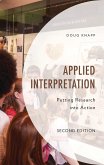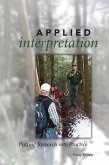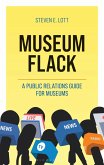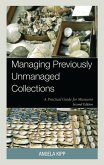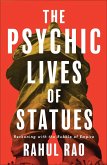Jon Kohl
Interpretive Theme Writer's Field Guide (eBook, ePUB)
How to Write a Strong Theme from Big Idea to Presentation
19,95 €
inkl. MwSt.
Sofort per Download lieferbar

10 °P sammeln
Jon Kohl
Interpretive Theme Writer's Field Guide (eBook, ePUB)
How to Write a Strong Theme from Big Idea to Presentation
- Format: ePub
- Merkliste
- Auf die Merkliste
- Bewerten Bewerten
- Teilen
- Produkt teilen
- Produkterinnerung
- Produkterinnerung

Bitte loggen Sie sich zunächst in Ihr Kundenkonto ein oder registrieren Sie sich bei
bücher.de, um das eBook-Abo tolino select nutzen zu können.
Hier können Sie sich einloggen
Hier können Sie sich einloggen
Sie sind bereits eingeloggt. Klicken Sie auf 2. tolino select Abo, um fortzufahren.

Bitte loggen Sie sich zunächst in Ihr Kundenkonto ein oder registrieren Sie sich bei bücher.de, um das eBook-Abo tolino select nutzen zu können.
The interpretive theme is the most important sentence an interpreter inks on paper. Despite its centrality to thematic interpretation, no single work has dedicated itself entirely to the art and craft of strong theme writing until now. The Interpretive Theme Writer's Field Guide builds on Sam Ham's 30-year thematic interpretation research legacy. While leaving theory to his books, this pocket companion offers writers strong theme examples, worksheets, exercises, inspirational quotes, and technique highlights. With contributions from Sam Ham, Ted Cable, Shelton Johnson, and Clark Hancock, this…mehr
- Geräte: eReader
- mit Kopierschutz
- eBook Hilfe
- Größe: 6.56MB
Andere Kunden interessierten sich auch für
![Interpretive Theme Writer's Field Guide (eBook, PDF) Interpretive Theme Writer's Field Guide (eBook, PDF)]() Jon KohlInterpretive Theme Writer's Field Guide (eBook, PDF)19,95 €
Jon KohlInterpretive Theme Writer's Field Guide (eBook, PDF)19,95 €![Applied Interpretation (eBook, ePUB) Applied Interpretation (eBook, ePUB)]() Doug KnappApplied Interpretation (eBook, ePUB)21,95 €
Doug KnappApplied Interpretation (eBook, ePUB)21,95 €![Applied Interpretation (eBook, ePUB) Applied Interpretation (eBook, ePUB)]() Doug KnappApplied Interpretation (eBook, ePUB)19,95 €
Doug KnappApplied Interpretation (eBook, ePUB)19,95 €![Museum Flack (eBook, ePUB) Museum Flack (eBook, ePUB)]() Steve LottMuseum Flack (eBook, ePUB)26,95 €
Steve LottMuseum Flack (eBook, ePUB)26,95 €![Managing Previously Unmanaged Collections (eBook, ePUB) Managing Previously Unmanaged Collections (eBook, ePUB)]() Angela KippManaging Previously Unmanaged Collections (eBook, ePUB)21,95 €
Angela KippManaging Previously Unmanaged Collections (eBook, ePUB)21,95 €![Teaching the Museum (eBook, ePUB) Teaching the Museum (eBook, ePUB)]() Teaching the Museum (eBook, ePUB)32,95 €
Teaching the Museum (eBook, ePUB)32,95 €![The Psychic Lives of Statues (eBook, ePUB) The Psychic Lives of Statues (eBook, ePUB)]() Rahul RaoThe Psychic Lives of Statues (eBook, ePUB)18,95 €
Rahul RaoThe Psychic Lives of Statues (eBook, ePUB)18,95 €-
-
-
The interpretive theme is the most important sentence an interpreter inks on paper. Despite its centrality to thematic interpretation, no single work has dedicated itself entirely to the art and craft of strong theme writing until now. The Interpretive Theme Writer's Field Guide builds on Sam Ham's 30-year thematic interpretation research legacy. While leaving theory to his books, this pocket companion offers writers strong theme examples, worksheets, exercises, inspirational quotes, and technique highlights. With contributions from Sam Ham, Ted Cable, Shelton Johnson, and Clark Hancock, this Field Guide is useful at the desk, in the exhibit hall, or on the trail. It recognizes that teams, even communities, create heritage themes, and introduces the Interpretive Framework methodology to facilitate community-based theme writing.
Produktdetails
- Produktdetails
- Verlag: Bloomsbury eBooks US
- Seitenzahl: 164
- Erscheinungstermin: 15. November 2018
- Englisch
- ISBN-13: 9781538196038
- Artikelnr.: 74627006
- Verlag: Bloomsbury eBooks US
- Seitenzahl: 164
- Erscheinungstermin: 15. November 2018
- Englisch
- ISBN-13: 9781538196038
- Artikelnr.: 74627006
- Herstellerkennzeichnung Die Herstellerinformationen sind derzeit nicht verfügbar.
Jon Kohl has published over 255 academic, professional, and popular articles, including a sci-fi romance novella, a book on holistic planning (with Steve McCool), a textbook on heritage interpretation in Spanish (with Marisol Mayorga), and this Field Guide. NAI has published some 40 of these works. Jon also works as an interpretive writer, translator, planner, blogger, and trainer with the PUP Global Heritage Consortium, a global non-profit he founded and directs to promote a holistic focus to natural and cultural heritage management. He earned a Master s in Environmental Management from Yale University School of the Environment and a Bachelor s in Ecology and Political Science from Dartmouth College. He served as an environmental educator and interpreter in the Peace Corps in Costa Rica, where he now lives with his family.
Contents
Foreword by Sam Ham: "Why I agreed to support this Field Guide"
Pre-Tour Warmup: This Field Guide Originates in the 1990s
Natural-Cultural History of the Second Edition
Acknowledgments
Trailhead: This Is How You Use This Field Guide
Stop 1: The Theme that Lurks Behind Thematic Interpretation
Stop 2: We Write Themes for Primary and Secondary Audiences
Stop 3: Strong Interpretive Themes Embody Big Ideas and Vehicles to Deliver
Them
Stop 4: Interpreters Must Ignite Their Inspiration for the Big Idea, Not
Just Write It
Stop 5: The Big Idea Develops within the Audience's Mind via a Vehicle
Stop 6: Themes Are Written for and by People Growing Up
Stop 7: Construction of a Presentation Structure Begins with a Theme
Stop 8: Theme Writing Can be Individual, Team-, or Community-Based
Stop 9: Interpretive Frameworks Leverage the Power of Community for
Interpretation
Stop 10: To Be with or Not to Be with AI Theme Writing Generators, That Is
the Question
Field Notes
Suggested Answers to Exercises
Verbs for Stronger Themes and More Engaging Commentaries
Field Inventory of Strong Themes in this Field Guide
Themes of Best-selling Novels of All Time
Interpretive Theme Writer's Worksheet
Critique of Themes from Real Webinar Participants
Oh, My Box!
Field Guidelines for Interpretive Theme Writing
References
Quote Sources
Glossary
Index
Voices from the Field
1 Floating the Tigris: Harnessing the Light of Thematic Interpretation by
Shelton Johnson
2 Crafting Themes Guided by Indigenous and Traditional Culturales by Kylie
Christian and Leanne Redpath
3 Voices from the Field by Thorsten Ludwig
4 I Want to Create Brilliant Big Ideas and Compelling Themes but. by Judy
Fort Brenneman
5 A Grand Theme Doesn't Ensure a Great Program-or Even a Good One by Don
Enright
6 Themes Contribute to Traveler Transformation atop Maslow's Hierarchy of
Needs by Colby Brokvist
7 Thematic Zone of Tolerance in a Theater Setting by Angela Pfenniger
8 Tablets of Stone or Statements of Accord by Michael Hamish Glen
9 Colombia Is the First Country to Adopt the Interpretive Framework by
Clara Osorio and Carlos Rosero
10 Theme Writing: A Trail that Never Ends by Ted Cable
Theme Spotlights
Theme Spotlight Pre-Tour Warmup. Message vs. Theme
Theme Spotlight Natural-Cultural History of the Second Edition: Why
Evolution Permeates this Field Guide
Theme Spotlight Trailhead: Themes of Themes
Theme Spotlight 2.1: Secondary Themes vs. Sub-Themes
Theme Spotlight 3.1. Theme = Object + Big Idea
Theme Spotlight 3.2. Big Idea vs. Interpretive Theme
Theme Spotlight 4.1. Connecting Unlike Points to Cast New Light
Theme Spotlight 4.2. Themes Should Present an Argument
Theme Spotlight 5.1. Can a Theme Have More than One Sentence?
Theme Spotlight 5.2. Transformative Themes Tap Deep Truths
Theme Spotlight 5.3. Adding Humanity to Non-Human Phenomena
Theme Spotlight 8.1. All Three Levels Can Interact
Theme Spotlight 9.1. Historical Scan Supports Theme Identification
Foreword by Sam Ham: "Why I agreed to support this Field Guide"
Pre-Tour Warmup: This Field Guide Originates in the 1990s
Natural-Cultural History of the Second Edition
Acknowledgments
Trailhead: This Is How You Use This Field Guide
Stop 1: The Theme that Lurks Behind Thematic Interpretation
Stop 2: We Write Themes for Primary and Secondary Audiences
Stop 3: Strong Interpretive Themes Embody Big Ideas and Vehicles to Deliver
Them
Stop 4: Interpreters Must Ignite Their Inspiration for the Big Idea, Not
Just Write It
Stop 5: The Big Idea Develops within the Audience's Mind via a Vehicle
Stop 6: Themes Are Written for and by People Growing Up
Stop 7: Construction of a Presentation Structure Begins with a Theme
Stop 8: Theme Writing Can be Individual, Team-, or Community-Based
Stop 9: Interpretive Frameworks Leverage the Power of Community for
Interpretation
Stop 10: To Be with or Not to Be with AI Theme Writing Generators, That Is
the Question
Field Notes
Suggested Answers to Exercises
Verbs for Stronger Themes and More Engaging Commentaries
Field Inventory of Strong Themes in this Field Guide
Themes of Best-selling Novels of All Time
Interpretive Theme Writer's Worksheet
Critique of Themes from Real Webinar Participants
Oh, My Box!
Field Guidelines for Interpretive Theme Writing
References
Quote Sources
Glossary
Index
Voices from the Field
1 Floating the Tigris: Harnessing the Light of Thematic Interpretation by
Shelton Johnson
2 Crafting Themes Guided by Indigenous and Traditional Culturales by Kylie
Christian and Leanne Redpath
3 Voices from the Field by Thorsten Ludwig
4 I Want to Create Brilliant Big Ideas and Compelling Themes but. by Judy
Fort Brenneman
5 A Grand Theme Doesn't Ensure a Great Program-or Even a Good One by Don
Enright
6 Themes Contribute to Traveler Transformation atop Maslow's Hierarchy of
Needs by Colby Brokvist
7 Thematic Zone of Tolerance in a Theater Setting by Angela Pfenniger
8 Tablets of Stone or Statements of Accord by Michael Hamish Glen
9 Colombia Is the First Country to Adopt the Interpretive Framework by
Clara Osorio and Carlos Rosero
10 Theme Writing: A Trail that Never Ends by Ted Cable
Theme Spotlights
Theme Spotlight Pre-Tour Warmup. Message vs. Theme
Theme Spotlight Natural-Cultural History of the Second Edition: Why
Evolution Permeates this Field Guide
Theme Spotlight Trailhead: Themes of Themes
Theme Spotlight 2.1: Secondary Themes vs. Sub-Themes
Theme Spotlight 3.1. Theme = Object + Big Idea
Theme Spotlight 3.2. Big Idea vs. Interpretive Theme
Theme Spotlight 4.1. Connecting Unlike Points to Cast New Light
Theme Spotlight 4.2. Themes Should Present an Argument
Theme Spotlight 5.1. Can a Theme Have More than One Sentence?
Theme Spotlight 5.2. Transformative Themes Tap Deep Truths
Theme Spotlight 5.3. Adding Humanity to Non-Human Phenomena
Theme Spotlight 8.1. All Three Levels Can Interact
Theme Spotlight 9.1. Historical Scan Supports Theme Identification
Contents
Foreword by Sam Ham: "Why I agreed to support this Field Guide"
Pre-Tour Warmup: This Field Guide Originates in the 1990s
Natural-Cultural History of the Second Edition
Acknowledgments
Trailhead: This Is How You Use This Field Guide
Stop 1: The Theme that Lurks Behind Thematic Interpretation
Stop 2: We Write Themes for Primary and Secondary Audiences
Stop 3: Strong Interpretive Themes Embody Big Ideas and Vehicles to Deliver
Them
Stop 4: Interpreters Must Ignite Their Inspiration for the Big Idea, Not
Just Write It
Stop 5: The Big Idea Develops within the Audience's Mind via a Vehicle
Stop 6: Themes Are Written for and by People Growing Up
Stop 7: Construction of a Presentation Structure Begins with a Theme
Stop 8: Theme Writing Can be Individual, Team-, or Community-Based
Stop 9: Interpretive Frameworks Leverage the Power of Community for
Interpretation
Stop 10: To Be with or Not to Be with AI Theme Writing Generators, That Is
the Question
Field Notes
Suggested Answers to Exercises
Verbs for Stronger Themes and More Engaging Commentaries
Field Inventory of Strong Themes in this Field Guide
Themes of Best-selling Novels of All Time
Interpretive Theme Writer's Worksheet
Critique of Themes from Real Webinar Participants
Oh, My Box!
Field Guidelines for Interpretive Theme Writing
References
Quote Sources
Glossary
Index
Voices from the Field
1 Floating the Tigris: Harnessing the Light of Thematic Interpretation by
Shelton Johnson
2 Crafting Themes Guided by Indigenous and Traditional Culturales by Kylie
Christian and Leanne Redpath
3 Voices from the Field by Thorsten Ludwig
4 I Want to Create Brilliant Big Ideas and Compelling Themes but. by Judy
Fort Brenneman
5 A Grand Theme Doesn't Ensure a Great Program-or Even a Good One by Don
Enright
6 Themes Contribute to Traveler Transformation atop Maslow's Hierarchy of
Needs by Colby Brokvist
7 Thematic Zone of Tolerance in a Theater Setting by Angela Pfenniger
8 Tablets of Stone or Statements of Accord by Michael Hamish Glen
9 Colombia Is the First Country to Adopt the Interpretive Framework by
Clara Osorio and Carlos Rosero
10 Theme Writing: A Trail that Never Ends by Ted Cable
Theme Spotlights
Theme Spotlight Pre-Tour Warmup. Message vs. Theme
Theme Spotlight Natural-Cultural History of the Second Edition: Why
Evolution Permeates this Field Guide
Theme Spotlight Trailhead: Themes of Themes
Theme Spotlight 2.1: Secondary Themes vs. Sub-Themes
Theme Spotlight 3.1. Theme = Object + Big Idea
Theme Spotlight 3.2. Big Idea vs. Interpretive Theme
Theme Spotlight 4.1. Connecting Unlike Points to Cast New Light
Theme Spotlight 4.2. Themes Should Present an Argument
Theme Spotlight 5.1. Can a Theme Have More than One Sentence?
Theme Spotlight 5.2. Transformative Themes Tap Deep Truths
Theme Spotlight 5.3. Adding Humanity to Non-Human Phenomena
Theme Spotlight 8.1. All Three Levels Can Interact
Theme Spotlight 9.1. Historical Scan Supports Theme Identification
Foreword by Sam Ham: "Why I agreed to support this Field Guide"
Pre-Tour Warmup: This Field Guide Originates in the 1990s
Natural-Cultural History of the Second Edition
Acknowledgments
Trailhead: This Is How You Use This Field Guide
Stop 1: The Theme that Lurks Behind Thematic Interpretation
Stop 2: We Write Themes for Primary and Secondary Audiences
Stop 3: Strong Interpretive Themes Embody Big Ideas and Vehicles to Deliver
Them
Stop 4: Interpreters Must Ignite Their Inspiration for the Big Idea, Not
Just Write It
Stop 5: The Big Idea Develops within the Audience's Mind via a Vehicle
Stop 6: Themes Are Written for and by People Growing Up
Stop 7: Construction of a Presentation Structure Begins with a Theme
Stop 8: Theme Writing Can be Individual, Team-, or Community-Based
Stop 9: Interpretive Frameworks Leverage the Power of Community for
Interpretation
Stop 10: To Be with or Not to Be with AI Theme Writing Generators, That Is
the Question
Field Notes
Suggested Answers to Exercises
Verbs for Stronger Themes and More Engaging Commentaries
Field Inventory of Strong Themes in this Field Guide
Themes of Best-selling Novels of All Time
Interpretive Theme Writer's Worksheet
Critique of Themes from Real Webinar Participants
Oh, My Box!
Field Guidelines for Interpretive Theme Writing
References
Quote Sources
Glossary
Index
Voices from the Field
1 Floating the Tigris: Harnessing the Light of Thematic Interpretation by
Shelton Johnson
2 Crafting Themes Guided by Indigenous and Traditional Culturales by Kylie
Christian and Leanne Redpath
3 Voices from the Field by Thorsten Ludwig
4 I Want to Create Brilliant Big Ideas and Compelling Themes but. by Judy
Fort Brenneman
5 A Grand Theme Doesn't Ensure a Great Program-or Even a Good One by Don
Enright
6 Themes Contribute to Traveler Transformation atop Maslow's Hierarchy of
Needs by Colby Brokvist
7 Thematic Zone of Tolerance in a Theater Setting by Angela Pfenniger
8 Tablets of Stone or Statements of Accord by Michael Hamish Glen
9 Colombia Is the First Country to Adopt the Interpretive Framework by
Clara Osorio and Carlos Rosero
10 Theme Writing: A Trail that Never Ends by Ted Cable
Theme Spotlights
Theme Spotlight Pre-Tour Warmup. Message vs. Theme
Theme Spotlight Natural-Cultural History of the Second Edition: Why
Evolution Permeates this Field Guide
Theme Spotlight Trailhead: Themes of Themes
Theme Spotlight 2.1: Secondary Themes vs. Sub-Themes
Theme Spotlight 3.1. Theme = Object + Big Idea
Theme Spotlight 3.2. Big Idea vs. Interpretive Theme
Theme Spotlight 4.1. Connecting Unlike Points to Cast New Light
Theme Spotlight 4.2. Themes Should Present an Argument
Theme Spotlight 5.1. Can a Theme Have More than One Sentence?
Theme Spotlight 5.2. Transformative Themes Tap Deep Truths
Theme Spotlight 5.3. Adding Humanity to Non-Human Phenomena
Theme Spotlight 8.1. All Three Levels Can Interact
Theme Spotlight 9.1. Historical Scan Supports Theme Identification


